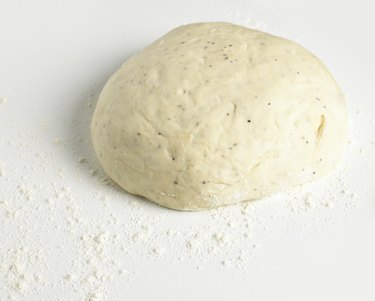
The gluten found in wheat, barely and rye can cause a variety of gastrointestinal problems for people who are diagnosed with gluten sensitivity, including nausea and vomiting. It's important, however, to be sure that you are properly diagnosed, as many similar digestive problems related to gluten can have similar symptoms, most notably celiac disease -- a much more severe form of gluten intolerance. Unlike gluten sensitivity, celiac disease can cause long-term damage to the intestines. Maintaining a gluten-free diet is the recommended treatment for both celiac disease and gluten sensitivity, but you should consult a doctor to ensure proper treatment.
About Gluten
Video of the Day
Gluten consists of the combination of two sub-proteins -- known as glutenin and gliadin -- that occur naturally in grains such as wheat, barley, rye, oats and triticale. Baked bread often has gluten added to form a stronger dough and create pockets that help capture air released by yeast and other leavening agents. Unlike other proteins, however, gluten is not able to be broken down to smaller components in the small intestine, which can cause a variety of digestive problems in some people, including nausea and vomiting.
Video of the Day
Gluten Sensitivity
Gluten sensitivity is a milder from of gluten intolerance. The symptoms of gluten sensitivity occur due to the innate immune response in the body, which is a basic defense response that doesn't cause long-term damage or attack the tissues of the body. Symptoms can include intestinal problems such as diarrhea, bloating, cramping, abdominal pain, nausea, vomiting and constipation. Additional symptoms, not related to the intestines, can include headaches, joint pain and numbness in the arms, fingers or legs. You might also feel like your head is foggy or unclear. According to the National Foundation for Celiac Awareness, those with gluten sensitivity experience a prevalence of nonintestinal symptoms compared to people with celiac disease. Unlike celiac disease, gluten sensitivity is not classified as an autoimmune disease and does not cause permanent damage to the small intestine.
Celiac Disease
Gluten triggers the autoimmune disorder known as celiac disease. It is more severe than gluten sensitivity because it can cause long-term damage to the villi of the small intestine, which are responsible for absorbing nutrients into the body. Celiac disease often has the same symptoms as gluten sensitivity, but it can also have symptoms related to the lack of absorption of nutrients. Malabsorption-related problems such as osteoporosis, organ disorders, tooth enamel defects, central and peripheral nervous system disease, gynecological problems and pancreatic disease can all occur as the result of celiac disease. Unlike gluten sensitivity, celiac disease can be detected by a blood test.
Proper Treatment
The symptoms, as well as the severity of symptoms, can vary from person to person with both gluten sensitivity and celiac disease, so it's important to get a proper diagnosis. Celiac disease can cause severe problems if left untreated. A proper diagnosis is also important because nausea and vomiting may be due to a food allergy. For example, an allergy to wheat -- which is commonly associated with gluten -- can cause similar symptoms as gluten sensitivity or celiac disease. No cure exists for gluten sensitivity or celiac disease, but a gluten-free diet can help manage symptoms. Upon diagnosis, seek the help of your doctor or a registered dietitian, as many foods that contain gluten also contain vital nutrients that need to be replaced in your diet.
Is this an emergency? If you are experiencing serious medical symptoms, please see the National Library of Medicine’s list of signs you need emergency medical attention or call 911.